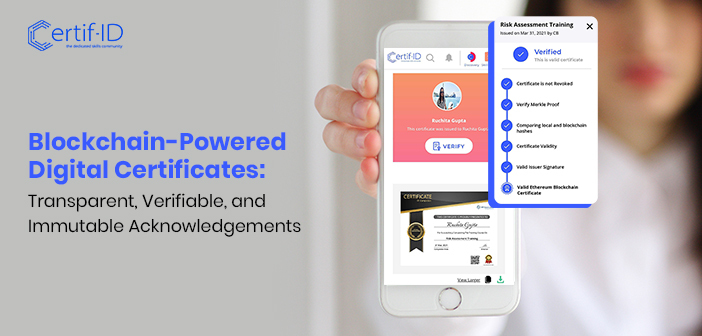What we mean by ‘skills’
Let’s look at skills as an amalgamation of an individual’s potential, aptitude, and the cumulative experience which enables them to perform tasks. Skills such as:
- Soft skills: critical thinking, complex problem-solving and creativity
- Technical skills: research, computing, dialysis and interpreting blueprints
- Hard-to-find skills: software developers, data scientists and social media strategists
Having the right skills helps individuals achieve their personal goals – earn new expertise on a particular subject, move forward in their career path – earn a promotion or seek new employment.
But having the right skills is not enough.
The skills have to be recognised and aligned with the industry demand. Before we talk about skills recognition, let’s take a look at the need to equip people with the latest skills.
Equip candidates with the right skills
For centuries, individuals honed their skills according to the demands of the labour market, learning only one profession their whole life. Digitization and the pandemic has widened the gap between people’s skills and the labor market. To close the gap, a collaboration between educational institutions or employee training institutes and candidates is necessary. There are two approaches for the same outcome – top-down and bottom-up.
- Top-down approach is when educational institutions or organizations come up with strategies to address the skill gap.
For instance, in order to make sure the organization is ready for the future and can sustain even during the toughest time, employers can come up with ways to retain new talent and onboard diverse ones. The skill gap can be bridged by exploring new solutions, such as outsourcing certain functions, mentor programs, and more.
- Bottom-up approach is when individuals come up with strategies to overcome their own skill gap.
To tackle the rising skill shortage and skill gap, institutions and employers are bound to expand their candidate’s current skill-sets. Whether it is new learning initiatives incorporated into the course syllabus or non-formal training in workplaces, institutions will need to align candidate’s skill levels in accordance with market demand.
Some of the simple ways to aid skill development include;
- Set learning or upskilling goals that are measurable and achievable
- Pair candidates with mentors who can provide guidance and support
- Encourage additional online learning from reputable external sources
- Tie up with other institutes to introduce relevant courses and increase employability levels
In addition to instilling the required skills, you will also need to provide your candidates with recognition of their skills and qualifications which are clearly understood across borders.
Skill assessment across borders
Let’s say a candidate has completed their training in a specific field and is being transferred to another country where there is a shortage of this specific skill. While learning, the candidate must have developed knowledge and grasped a wide variety of skills. But, how will their soon-to-be boss across the border know it? There is no way of accessing or assessing the candidate’s complete skill set, which means, they will not recognize their full potential right from the start.
 For this purpose, making skills recognizable everywhere is essential. There are a number of tools available to document skills and qualifications, ensuring they’re understandable and comparable across borders. We recommend blockchain-based digital certificates as the most foolproof way of documenting and recognising skills.
For this purpose, making skills recognizable everywhere is essential. There are a number of tools available to document skills and qualifications, ensuring they’re understandable and comparable across borders. We recommend blockchain-based digital certificates as the most foolproof way of documenting and recognising skills.
Blockchain for documentation and skills recognition
A Blockchain is a distributed ledger which stores encrypted, immutable publicly accessible records. Every change made to a record in the blockchain is traceable, this ensures that the data is secure, instantly verifiable and tamper-free. Hence, using Blockchain to document skills learning and standardising certification comes with several advantages including:
- Transparency of data and records
- Verifiability of data and records shared
- Enhanced security against malicious attacks
Digital certificates that can be accessed across borders
Digital certificates issued on blockchain can be shared and verified by potential employers or further education institutes, making the hiring process and certificate verification a lot less taxing.
For instance, a digital certificate issued on the Certif-ID platform can be accessed from anywhere across the globe. The training or educational institute issuing the digital certificate can customise them. They can add information to show a candidate’s level of skills.
As skills are assessed differently in different parts of the world, having access to a candidate’s certificate and understanding that candidate’s level of skill is revolutionary. It will certainly help the hiring manager make a better decision, and if the candidate will need additional training for the job.
To know more about how the Certif-ID platform works and how you can use digital certificates to recognise skill, please book a demo with our experts.
Also read: Digital Badges vs Digital Certificates: Which Should You Choose? https://nationalskillsnetwork.in/digital-badges-vs-digital-certificates-which-should-you-choose/
Certif-ID also offers –
Apart from enabling training and educational institutions to issue blockchain-based digital certificates to students, Certif-ID offers many other features including:
- Data analytics: the platform’s improved certificate analytics offers valuable insights through data visualization, helping educators improve credential tracking, engagement metrics and learning outcomes.
- SkillPass: your graduates can build their digital profile using exciting features like CV generator, self-assessment, video CV creator, etc., to showcase their skills and competencies and track their learning journeys in the best possible way.
- Certif-ID Discovery: making it easy for institutes to promote additional learning, the portal offers a variety of online technical and soft skill courses in a range of areas including automotive, healthcare, construction and nursing.
We’re an end-to-end platform helping institutions to digitise their certification process on blockchain and graduates on their education to employment journey.
For more information, please write to us or schedule a meeting.














Comments 1